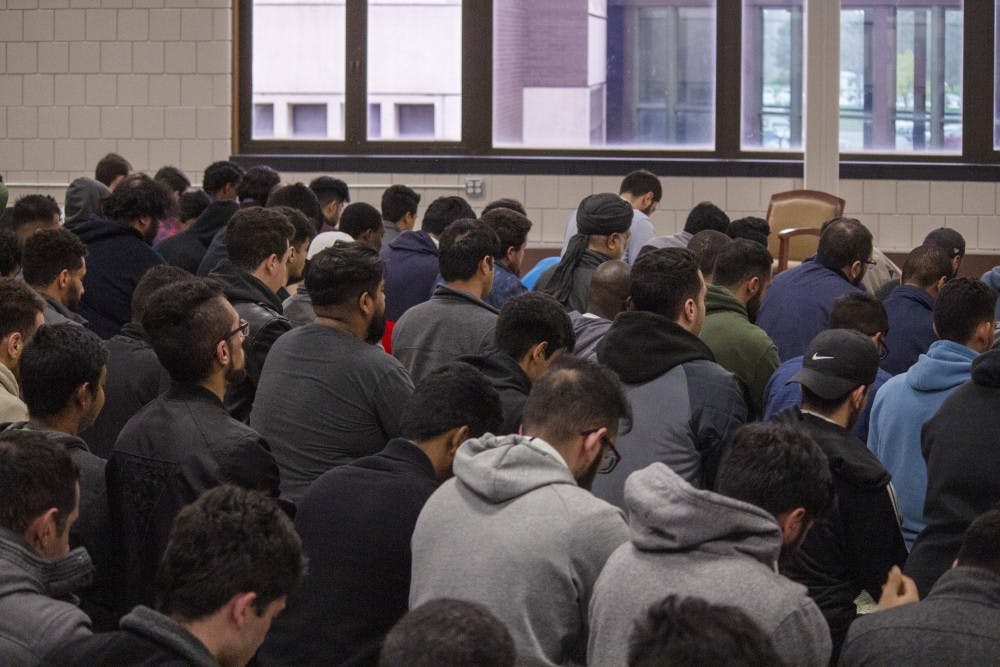Starting this week, Muslim students at UB, along with Muslim people all over the world, will be fasting from sunlight to sunset to observe Ramadan.
Muslims observe Ramadan each year during the ninth month of the Islamic calendar to commemorate Allah giving the Prophet Muhammad the first verses of the Quran. Since the Islamic calendar is lunar, Ramadan will either begin Monday or Tuesday, depending on when the crescent moon appears.
Students observing Ramadan at UB will wake up around 3:30 a.m. to eat a pre-dawn meal –– called suhoor or sehri –– and pray, after which they will abstain from eating, drinking (including water), and haram –– the Muslim equivalent of sin –– during the day. When the sun sets, the students will break their fast around 8:20 p.m. and eat a meal called iftar. Given the estimated time of sunrise and sunset in Buffalo, students can expect to fast for roughly 16 hours per day while balancing finals week.
Muslim students at UB said fasting during Ramadan is a way for people to empathize with the struggles of those who cannot afford to eat or drink. Those who are too weak or sick to fast, however, are exempt.
Since the first few weeks of Ramadan coincide with finals week this year, Muslim students observing Ramadan face a separate set of challenges. Shahnaz Hamade, a senior psychology major, said she has to stay up through the night since it’s the only time she can drink coffee and stay hydrated “for that boost to concentrate” while she studies.
“It’s a bit exhausting especially when you have to wake up for suhoor and you’re trying to get your last meal and you’re sitting there trying to write your paper or studying for your exams,” Hamade said. “It’s not really the easiest thing to do, which is why I really hope teachers would understand and maybe let us take our exams earlier or anything else that would help us succeed.”
Anika Tabassum, a senior environmental engineering major, said she will try to fast, but if she begins to feel dizzy and cannot study, she will consider breaking it.
“In Islam, if you're feeling weak, you can break your fast. That's what my mom told me, your health comes first,” Tabassum said. “But if you break your fast, you have to make up for it later.”
At a pre-Ramadan iftar dinner, hosted by the Muslim Women Council of the Muslim Student Association in Harriman Hall, group members played songs of equality and love, prayed together, played games and ate a dinner of chicken curry, rice, dates and other fruit.

Ilhan Noor, a junior mental health major and member of MWC, said although she has regularly observed Ramadan throughout her life, its spiritual meaning came to her just two years ago.
“[Ramadan] became for me more than just starving myself. It became a time for me to notice what my other ummah — the people of the world — go through,” Noor said. “Like, the people that are starving in Syria, what are they going through? It's a day for me to recognize that.”
Tabassum said observing Ramadan makes it easier for families to give zakat –– charitable donations –– as they understand the struggles of impoverished communities.
Hamade said fasting, along with refraining from committing haram, acted as physical, mental and emotional “detox” for the body.
“We don't only fast from food and drinking during Ramadan. We don't swear, we don't talk badly about people, hurting other people breaks your fast,” Hamade said. “A lot of things can break your fast and it's not just about food and water.”
In addition to not speaking badly of others or causing harm, abstaining from haram also includes not lying, cheating, stealing or engaging in sexual relations.
Ayesha Kazi*, a senior business major, and Tabassum said Ramadan in their home countries –– India and Saudi Arabia, respectively –– is both religious and social in nature, entailing nights of feasts, family, friends and praying.
But in Buffalo, rather than waking up to azaan — prayer calls — and eating with their families, Kazi and Tabassum set alarms on their phones and eat sehri and iftar together.
Rather than meeting up with community members to read the Quran as she did in India, Kazi reads the Quran translations on her phone.
“I really wanted to know the meaning of the Quran,”Kazi said. “I’ve read it before but I never knew the meaning. So that’s what I’m trying to do this year.”
The Muslim Student Association will be hosting dinners at 8 p.m. in Student Union 210 all through this week and next. Ahsanul Haque, the incoming Muslim Student Association president, said the dinners are open to everyone, not just Muslim students observing Ramadan.
*Kazi is on The Spectrum’s advertising staff.
Tanveen is a co-senior news editor and can be reached at tanveen.vohra@ubspectrum.com and on Twitter @TanveenUBSpec.
Tanveen Vohra is a former senior news editor and covered international relations and graduate student protests.






